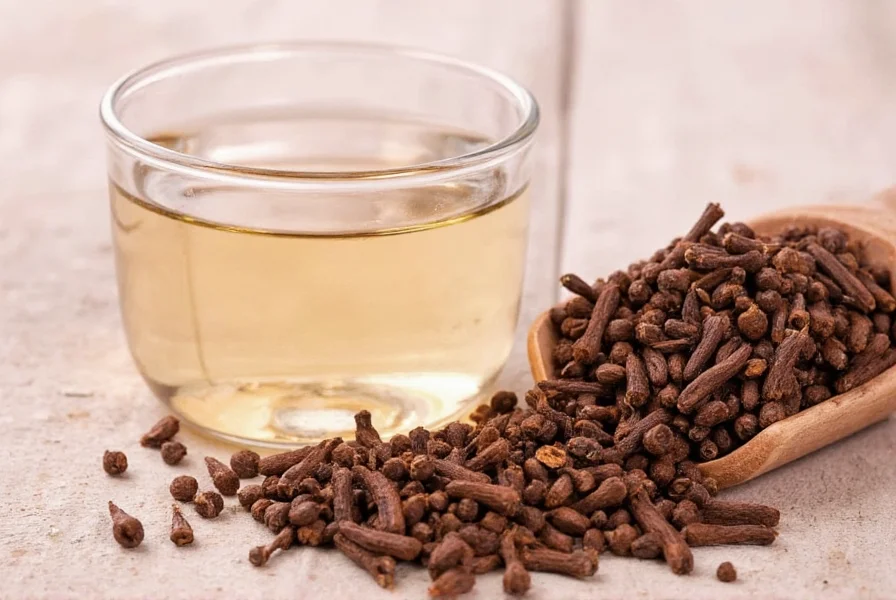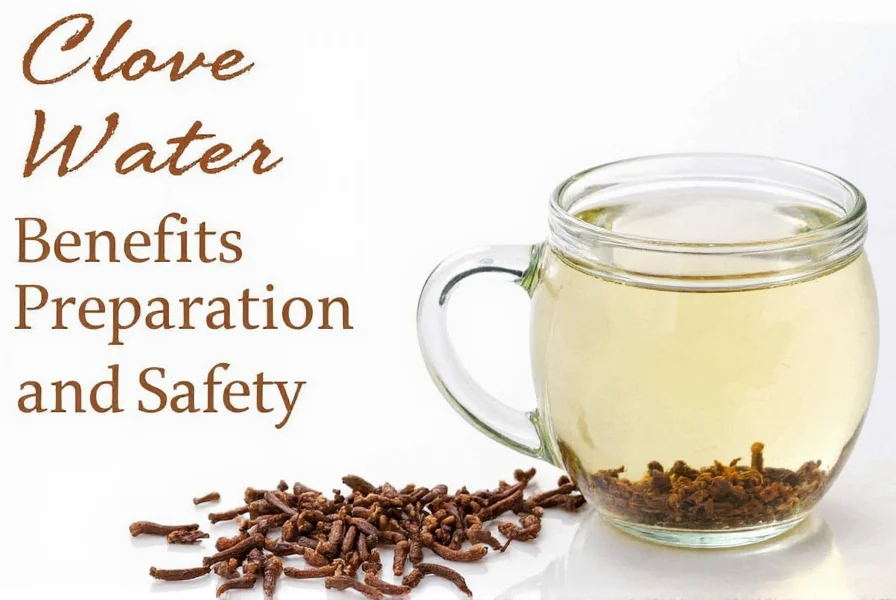Clove water has gained attention as a natural remedy with roots in traditional medicine practices across various cultures. This simple preparation harnesses the bioactive compounds found in cloves, particularly eugenol, which constitutes 70-90% of clove essential oil and demonstrates documented antimicrobial and anti-inflammatory properties. While not a substitute for professional medical care, understanding how to properly prepare and use clove water can help individuals make informed decisions about incorporating this traditional practice into their wellness routines.
Understanding Clove Water Composition
Clove water differs significantly from clove essential oil in both concentration and safety profile. The water-based infusion extracts water-soluble compounds more gently than oil extraction methods, resulting in a much lower concentration of active components. Research published in the Journal of Agricultural and Food Chemistry identifies eugenol as the primary bioactive compound responsible for clove's therapeutic properties, along with smaller amounts of beta-caryophyllene and other terpenes.
Unlike clove oil, which requires dilution before topical use due to its high potency, clove water provides a milder delivery method suitable for oral consumption in appropriate amounts. The concentration of eugenol in properly prepared clove water typically ranges from 0.5% to 2%, compared to 70-90% in essential oil, making it significantly less potent but also less likely to cause irritation when used correctly.

Evidence-Based Benefits and Limitations
Scientific research provides some support for specific applications of clove water, though important limitations exist. A 2018 review in Phytotherapy Research examined multiple studies on clove's dental applications, noting that eugenol demonstrates measurable antimicrobial activity against oral pathogens including Streptococcus mutans and Porphyromonas gingivalis.
For temporary toothache relief, clove water serves as a safer alternative to direct clove oil application, which can cause tissue damage. The American Dental Association acknowledges clove's traditional use for dental pain but emphasizes it provides only temporary relief and doesn't address underlying dental issues requiring professional care.
| Application | Scientific Support Level | Recommended Usage |
|---|---|---|
| Oral antimicrobial effects | Moderate (laboratory studies) | Rinse for 30 seconds, 2x daily |
| Temporary toothache relief | Low-moderate (anecdotal + limited studies) | Rinse as needed, max 3x daily |
| Digestive support | Low (traditional use only) | 4-6 oz after meals, max 2x daily |
| Systemic health benefits | Insufficient evidence | Not recommended as treatment |
Proper Preparation Methods for Clove Water
How to make clove water for oral health requires attention to proper technique to maximize benefits while minimizing potential risks. The hot infusion method provides the most consistent results for therapeutic applications:
- Use 4-5 whole, high-quality cloves per 8 ounces of filtered water
- Bring water to a boil, then remove from heat
- Add cloves and cover, steeping for 15-20 minutes
- Strain to remove cloves before use
- Cool to comfortable temperature before oral application
Cold infusion methods (soaking cloves in room temperature water for 6-8 hours) produce a milder preparation suitable for sensitive individuals but with reduced active compound extraction. For dental applications, allow the prepared clove water to cool completely before using as a mouth rinse to avoid thermal damage to oral tissues.
Safety Considerations and Contraindications
While generally recognized as safe in moderate amounts, clove water presents specific safety considerations. The European Medicines Agency recommends limiting eugenol intake to no more than 2.5 mg per kilogram of body weight daily. For a 150-pound adult, this translates to approximately 1-2 cups of properly prepared clove water.
Individuals should avoid clove water if:
- They are pregnant or breastfeeding (insufficient safety data)
- They have bleeding disorders or take anticoagulant medications
- They have sensitive oral mucosa or open mouth sores
- They are under 2 years old (risk of tissue irritation)
Prolonged daily use beyond 2-3 weeks may lead to oral mucosal irritation or disruption of beneficial oral microbiome. Always consult with a healthcare provider before using clove water regularly, especially if managing chronic health conditions or taking prescription medications.
Integrating Clove Water into Wellness Practices
Clove water for digestive health represents one of its traditional applications, though scientific evidence remains limited. Some studies suggest eugenol may help relax gastrointestinal smooth muscle, potentially easing minor digestive discomfort. However, researchers note that most evidence comes from animal studies or in vitro models, with limited human clinical trials.
When considering clove water vs clove oil for dental pain, the water-based preparation offers a significantly safer profile for oral use. Dental professionals often recommend clove water as a temporary measure while awaiting professional care, but emphasize that persistent dental pain requires evaluation by a dentist to address underlying issues like infection or decay.
For those exploring traditional remedies, understanding the scientific evidence for clove water helps separate established benefits from anecdotal claims. While research supports certain antimicrobial properties, claims about systemic health benefits often exceed current scientific evidence. The most well-documented applications remain topical for oral health purposes, where the antimicrobial effects can be directly applied to the affected area.
Conclusion
Clove water represents a time-honored preparation with some scientifically supported applications, particularly for temporary oral health support. Its preparation simplicity makes it accessible, but users should maintain realistic expectations about its capabilities and limitations. As with any natural remedy, proper usage knowledge, appropriate expectations, and awareness of safety considerations are essential. When used correctly as a complementary practice alongside professional healthcare, clove water can be a valuable addition to personal wellness routines.
How long should I steep cloves for optimal clove water benefits?
For optimal extraction of beneficial compounds while minimizing bitter compounds, steep whole cloves in hot (not boiling) water for 15-20 minutes. Longer steeping times beyond 30 minutes may extract more tannins, increasing bitterness without significantly enhancing therapeutic compounds. Cold infusion methods require 6-8 hours for adequate extraction but produce a milder preparation.
Can clove water replace regular mouthwash for oral hygiene?
Clove water should not replace regular oral hygiene practices or commercial mouthwashes designed for daily use. While it offers antimicrobial benefits, it lacks the consistent formulation, pH balance, and additional ingredients found in dental products specifically designed for oral health. Use clove water as a temporary supplement to regular oral care, not as a replacement, and limit use to 1-2 times daily for short durations.
Is clove water safe for children's dental pain?
Clove water is generally not recommended for children under 2 years old due to potential mucosal irritation. For older children experiencing dental pain, consult a pediatric dentist before use. If approved, dilute prepared clove water with equal parts plain water and limit use to a single rinse that's immediately spit out. Never allow young children to swallow clove water, and always supervise its use.
How does clove water compare to clove oil for toothache relief?
Clove water provides a significantly safer option for toothache relief compared to clove oil. While both contain eugenol, clove oil is highly concentrated (70-90% eugenol) and can cause tissue damage, burns, or allergic reactions when applied directly. Clove water contains only 0.5-2% eugenol, making it much gentler while still providing some antimicrobial and pain-relieving benefits. Dental professionals typically recommend clove water as a safer temporary measure while awaiting professional care.
Can I store prepared clove water for later use?
Freshly prepared clove water is always preferable, but you can refrigerate it for up to 48 hours. Store in a clean, airtight glass container away from light. Discard if you notice any cloudiness, off smells, or mold growth. Do not freeze clove water as this can alter its chemical composition. For best results, prepare only the amount you'll use within one day, as the active compounds gradually degrade over time.











 浙公网安备
33010002000092号
浙公网安备
33010002000092号 浙B2-20120091-4
浙B2-20120091-4